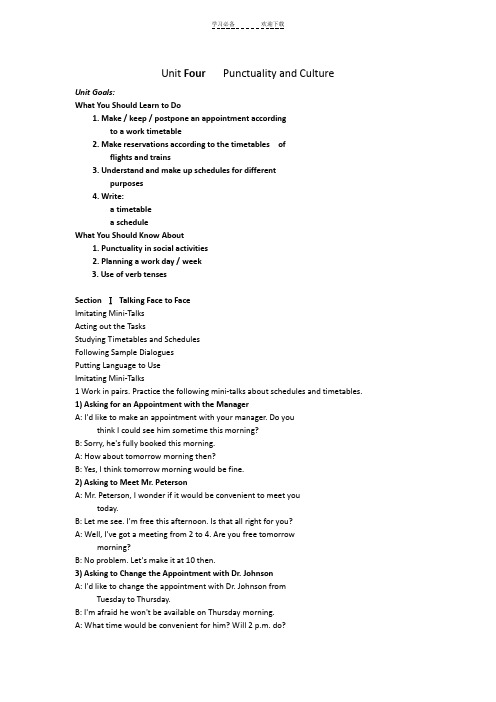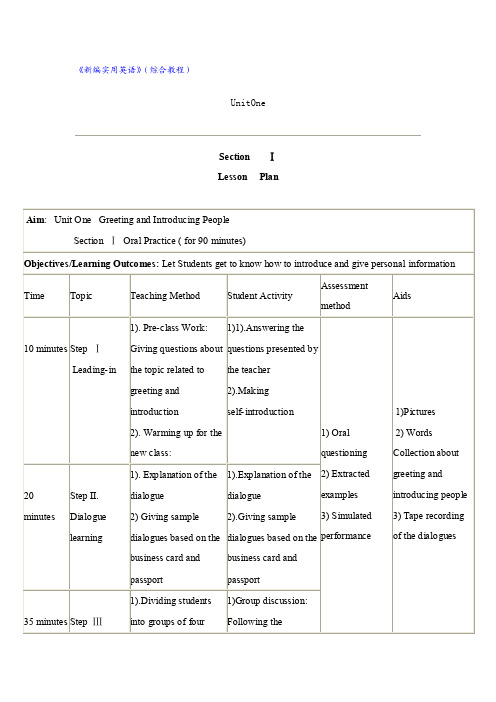新编实用英语综合教程1第四版Unit4ppt课件
新编实用英语综合教程1第四版Unit4精编版

Imitating Mini-Talks
Speak and Recite
Acting out the Tasks
Speak and Perform
Studying Timetables and Schedules
Study and Imitate
Following Sample Dialogues Imitate and Perform
morning?
B: No problem. Let's make it at 10 then.
Unit | Four
Window on Key Words
3) Asking to Change the Appointment with Dr. Johnson A: I'd like to change the appointment with Dr. Johnson from
Bob: Oh, how long does it stop over in Guangzhou? Receptionist: From 11:50 to 12:50.
Bob: 11:50 to 12:50. That's an hour. Well, I prefer a direct flight. Receptionist: I'm sorry, but there's no direct flight on Tuesday.
Putting Language to Use
Speak and Complete Speak and Communicate
Unit | Four
SECTION I Talking Face to Face
Imitating Mini-Talks
大学英语综合教程1_Unit4

sacrifice:
1. n. offering of sth. valuable to a god; giving up of sth.
Some cultures practise animal sacrifice to their gods. 她父母为她上大学在多方面做出了牺牲。 Her parents made many sacrifices so that she could go to university. 2. v. offer sth. to a god; give up sth. important for a particular purpose He sacrificed his life to save a drowning child. Do you approve of sacrificing comfort to appearance? 你赞成只要风度不要舒适吗?
crash: 1. v. fall or strike suddenly, violently, and noisily Experts were analyzing the data in the black box (the flight recorder) of the crashed plane. The lightning flashed and thunder crashed. 2. n. violent fall, blow or breaking The tree fell with a great crash. All the passengers were injured in the car crash.
move in: take possessionand see our new house when we’ve moved in. We moved out on Monday and the new tenants moved in on Tuesday.
《新编实用英语》综合教程 1 电子课件使用说明

Making reservations according to the timetables of flights and trains.
1. Is there a flight to Hong Kong on Tuesday, the 16th?
1. I wonder if we could postpone / put off the appointment to tomorrow afternoon.
2. I’m afraid the manager is all booked up this week. How about next week ?
10.When does it arrive in Macao?
11. I’d like to get tow tickets to Beijing at 9:00 this morning .
12. Can I have a seat on Flight 455 to New York tomorrow afternoon , please ?
9. If you are free , I’ll come to see you this weekend.
10. I’ve got an appointment at 8:30with Mr. Anderson , the bank manager.
B. Postponing an appointment
weekend. 4. What are your plans for this weekend? 5. I need to write a business report this morning . 6. The conference is on Thursday , right? 7. I’ll take the 2:15 flight back on Friday afternoon.
第一册Unit4新编实用英语教程第4版高教社教案

Unit Four Punctuality and CultureUnit Goals:What You Should Learn to Do1. Make / keep / postpone an appointment accordingto a work timetable2. Make reservations according to the timetables offlights and trains3. Understand and make up schedules for differentpurposes4. Write:a timetablea scheduleWhat You Should Know About1. Punctuality in social activities2. Planning a work day / week3. Use of verb tensesSection ⅠTalking Face to FaceImitating Mini-TalksActing out the TasksStudying Timetables and SchedulesFollowing Sample DialoguesPutting Language to UseImitating Mini-Talks1 Work in pairs. Practice the following mini-talks about schedules and timetables.1) Asking for an Appointment with the ManagerA: I'd like to make an appointment with your manager. Do youthink I could see him sometime this morning?B: Sorry, he's fully booked this morning.A: How about tomorrow morning then?B: Yes, I think tomorrow morning would be fine.2) Asking to Meet Mr. PetersonA: Mr. Peterson, I wonder if it would be convenient to meet youtoday.B: Let me see. I'm free this afternoon. Is that all right for you?A: Well, I've got a meeting from 2 to 4. Are you free tomorrowmorning?B: No problem. Let's make it at 10 then.3) Asking to Change the Appointment with Dr. JohnsonA: I'd like to change the appointment with Dr. Johnson fromTuesday to Thursday.B: I'm afraid he won't be available on Thursday morning.A: What time would be convenient for him? Will 2 p.m. do?B: Yes, that'll be fine.4) Asking About the Working Hours of a Ticket OfficeA: What are the office hours?B: Well, the office hours are from 9 a.m. to 6 p.m.A: Do you work on weekends?B: On Saturday the office is open from 9 a.m. to 3 p.m., but on Sunday we are closed.5) Asking About the Flights for MacaoA: Do you have flights to Macao?B: We have only one flight to Macao each week, at 1:40 p.m.Wednesday.A: When does it arrive in Macao?B: At 3:40 p.m.2 Work in pairs and act out the tasks by following the above mini-talks.1 Task:Look at the flight timetable in Exercise 3.Ask about the departure and arrival time2 Task:Look at the flight timetable in Exercise 3.Ask about the Tuesday flight for Hong Kong3 Task:Look at Mark's schedule in Exercise 3.Call to ask Mark for a change of an appointment.4 Task:Look at Mark's schedule in Exercise 3.Ask to make an appointment to see Mark on Wednesday.5 Task:Look at Mark's schedule in Exercise 3.An old friend in Hong Kong asks to see Mark on Thursday.Studying Timetables and SchedulesRead the following sample dialogues and try to perform your own tasks.Putting Language to UseSpeak and CompleteMark: Miss Wang, I want to 1 __________ an evening train to Harbin so thatI can get there the next morning. Do you know the schedule?Miss Wang: Yes. I have got a 2 __________________ here.Mark: Is there a train leaving around 6?Miss Wang: 3 ______________ one at 6:15.Mark: When will it get there?Miss Wang: 4 ______________ at about 8 next morning.Mark: That's the one I need. Thank you very much.Miss Wang: You are 5 ______________.SECTION II Being All EarsLearning Sentences for Workplace CommunicationHandling a DialogueUnderstanding a Short Speech / TalkLearning Sentences for Workplace Communication1 Listen to 10 sentences for workplace communication cross-referenced withtheir Chinese translations.arrange 安排confirm 确认due 规定(到达) 的delay 耽搁2 Listen to the following sentences for workplace communication in Column A andmatch each one with its Chinese version in Column BKey:1-i, 2-j, 3-d, 4-c, 5-f, 6-e, 7-h, 8-g, 9-a, 10-b3 Listen to 6 sentences for workplace communication and choose their right responses4 Listen to a dialogue and decode the message by filling in Susan's scheduleaccording to what you have heard.5 Now listen to a short speech / talk and fill up the blanks according to what youhave heard. The words in brackets will give you some hints.6 Listen to the speech / talk again and complete the information in Column A withthe right choices in Column B.SECTION III Trying Your HandPracticing Applied WritingWriting Sentences and Reviewing Grammar1 Fill in the office hours making use of the information in the passage that follows.2 Translate the following schedule into English, using the data bank in theWorkbook for reference.Writing Sentences and Reviewing Grammar3 Complete the following sentences, using the right verb forms4 Correct the errors in the following sentences.5 Translate the following sentences into English6 Suppose this is your schedule for the coming three days. Write a paragraph ofabout 100 words based on the information given in the schedule. You maystart the passage with the sentence: I've got a very busy schedule.KEYS: I've got a very busy schedule. I'm catching the 9:45 flight on October 8 and arriving in Shanghai at 2:00 in the afternoon. Bob is meeting me at the airport. I will check into Beach Hotel and have a rest there in the evening. On October 9, I'm meeting Mrs. Black at 10:15 a.m. and after having lunch at Beach Hotel we're visiting the plant at 2:30 p.m. The next day I'm attending a conference at 9 a.m. I'm leaving Shanghai in the afternoon. I'm taking a flight at 3:30 p.m. and arriving back at 7:45 p.m. Phillip will be there to pick me up at the airport.SECTION IV Maintaining a Sharp EyeInformation Related to the Reading PassageAmericans and Europeans consider time to be an asset that can be spent and saved; therefore, proper scheduling of time and its appropriate allocation to various competing tasks is an important part of organizational management. Variations in time use are expected to influence performance and stress, as well as other outcomes. It is a vital strategic element. Thelarge amount of management processes and methods developed to improve performance by managing time use proves the importance placed on time. Here are a few famous quotes and sayings about time and punctuality:1 Explanation of Difficult Sentences1. (Para. 1) One of the cultural differences that tend to annoy Americans has to dowith understanding of punctuality.Analysis: Has to do with is a phrase meaning has a specified relationship with.It is the predicate of the sentence. That introduces a restrictive relativeclause modifying differences.Translation:有一种常会惹恼美国人的文化差异可能关系到对守时的不同理解。
新编实用英语教程PPT课件

Follow the Samples Act Out Put in Use Data One Sample Two
2021/3/12
2
Sample 1
MeetingGPlaedo/HpaleppfyortothmeeFetirysotuTime
Click here to listen
to see you I’m LuYang
L=Lu Yang
D=Dick
L: Hello, nice to meet you. My name is Lu Yang.
D: How do you do, Professor Lu? I’m Richard
my business card
L: Very well, thank you. What brings you here?
How about our company?
J: I’m here on buHsoiwneasbso.utHaodwrinakr?e things going in your
How about taking a walk?
2021/3/12
5
Sample 2
Meeting People Again
L: Hello, Jack. Haven’t seen you for ages. How’s
everything?
J: Hi, Li. Whatfaorpplleeaassuarnet surprise! I’m fine. And you?
2021/3/12
9
Click here to listen
A: Nice to meet you. I’m Robert Miller from Canada.
《新编实用英语》综合教程1电子课件使用说明.pps

Introduction to courseware
Characteristics of courseware
Interactivity: Courseware offers various interactive features such as quizzes, exercises, and simulations to engage students in active learning.
Homework and exams
03
Detailed explanation of courseware content
The text content is selected from authentic English materials to ensure language accuracy and authenticity.
Authentic English audio materials are used to help learners improve their listening comprehension skills. They are asked to listen to the audio and complete related exercises.
根据个人兴趣和需求,选择想要学习的课程,点击进入学习页面。
可以根据课程分类、难易程度等条件筛选课程,方便选择适合自己的课程。
Course browsing and selection
点击“开始学习”按钮,进入课程学习界面,按照教师的要求进行学习。
在学习过程中,可以随时记录笔记,方便回顾和巩固知识点。
Target audience
02
How to use courseware
新编实用英语综合教程1第四版Unit1演示版.ppt

You: 6 (表示感谢) _T_h_a_n__k_y_o_u_____. But I don't have a card yet. As I go online, I can give you my e-mail address.
.精品课件.
1 Unit | One
.精品课件.
2 Unit | One
Talking Face to Face
Section Ⅰ
Contents
Section Ⅴ
Appreciating Culture Tips
Section Ⅱ
Being All Ears
Section Ⅲ
Section Ⅳ
.精品课件.
Back
11 Unit | One
Putting Language to Use
5 Imagine you are meeting an English teacher from the USA at the airport. Read aloud the following dialogue with your partner by putting in the missing words.
very good time.
B: I'm glad you enjoyed it.
A: Thanks for inviting me.
B: Thanks for coming.
.精品课件.
介绍 教授 夫人
Back
6 Unit | One
Window on Key Words
Acting out the Tasks
新编实用英语1PPT课件

赵娟
教育部2000年颁布了《高职高专教育英 语课程教学基本要求(试行)》。明确了职业 技术院校所开设的高职英语课程的主要教学目 标就是培养学生实际应用英语的能力,培养实 用性人才,教学方向是以应用为目的,实用为 主,够用为度。根据《基本要求》,并结合我 校学生具体情况,最终选择高等教育出版社 2002年出版的《新编实用英语——综合教程》 作为我校高职英语课程的主要教材。
3.Act Out
此项编排的目的是为学生提供模
仿套用所学对话样例的小语言环境。 在学习5个短小精炼,生动有趣,针对 性强,主题突出的小对话之后分别设 定了一个相关的交际“任务”。教师 可引导学生根据上文样例进行口头交 际的模仿套用练习,取得边学边用的 效果。
Put in Use
此项训练一般含3项练习,要求在课上口头完 成。其编排意图如下:
《新编实用英语》由《综合教程》, 《学学·练练·考考》,《教师参考书》以及 配套的多媒体学习课件,电子教案,网络课 程等组成。
《新编实用英语——综合教程》分为四 册,每册修订后缩编为八个单元。每个单元 都由说(Talking Face to Face),听(Being All Ears),读(Maintaining a Sharp Eye), 写(Trying Your Hand)四部分组成,另有 一个“趣味阅读”部分(Having Some Fun)。各部分的具体内容如下:
此部分也可与Applied Writing结合起来 进行教学,使学生能够看懂应用文样例,了 解其结构特点和语言形式,并能模拟套写简 单的应用文。
2.Follow the Samples
这里提供的对话样例是紧扣本课 交际话题编写的,其目的是为学生学 习该话题的口头交际提供模仿的样本, 故教师应引导学生首先学习样例,达 到能流利朗读和熟记常用词语和句式 的程度,为下一步模拟套用做好准备。
新编实用英语(第四版)综合教程4电子教案Unit 4 The IT Age

B: Yes, indeed. There are numerous information centers and data banks that 2 offer all kinds of information (提供各种各样的信息) .
A: 3 But there are always two sides to everything. (但事物都是一分为二的) . The Internet is no exception. We cannot neglect its bad effects.
Back
Unit | Four
2 Complete the conversation by translating the Chinese into English.
A: 1 The Internet is such a miraculous place (因特网是一个神奇的地方) that you can do anything you like there.
pronounce the sign in the e-mail address? Jack: You mean the letter “a” with a little tail? We pronounce
it as “at”. Mary: I see. Thanks. What else do you do when you are
A: I think 5 parental guidance is particularly important for children (对孩子们来
说父母的指导尤其重要) .
Back
Unit | Four
2 Complete the conversation by translating the Chinese into English.
新编实用英语综合教程1第四版Unit1ppt课件

You: How was the 8 ___j_o_u_rn__e_y_____, Mary?
Trying Your Hand
Unit | One
Imitating Mini-Talks Acting out the Tasks Studying Business Cards Following Sample Dialogues Putting Language to Use
Unit | One
2 Work in pairs and act out the tasks by following the above mini-talks.
Back
Unit | One
Studying Business Cards
3 Business cards are very useful for introducing people. Read the following cards carefully and try to use the information to practice short dialogues.
Imitating Mini-Talks
1 Work in pairs. Practice the following mini-talks about greeting and introducing people.
Window on Key Words
1) Meeting People for the First Time A: Hello, Mr. David Green! I'm Lily Zhang. B: Hi, Miss Zhang! Nice to meet you. A: Nice to meet you, too. Mr. Green. B: Oh, please call me David.
《新编实用英语》(综合教程)Unit1

《新编实用英语》(综合教程)UnitOneSection ⅠLesson PlanContent: Section ⅠTalking face to faceAim: The topic area of Taking Face to Face in this unit is to talk about greeting people and introducing with each other. The focus of functions is to Let Students get to know how to introduce and give personal informationImportant and difficult points:Procedure and methods:Step I. Leading-in1. Pre-class Work: Giving questions about the topic related to greeting and introduction2. Warming up for the new class3. Student Activity:1).Answering the questions presented by the teacher2). Making self-introductionStep II. Dialogue learning1. Explanation of the dialogue2. Giving sample dialogues based on the business card and passport3. Student Activity:1). Listening to the tape recording of the dialogues2).Pair work: Learning the dialogues by heart and Reading out the dialogues loudly in pairs.Step ⅢActing outAfter learning the five dialogues on the book1 Dividing the students into groups of four or five2 Offering more situations for students to make dialogue3 Summarizing this part4 Student Activities:1).Group discussion: Following the dialogue and making dialogues based on the given situations2). Comments on classmates’performanceStepⅣPutting in use1. Completing and checkingInstructions: Ask students to work in groups to complete by filling in the blanks on Page 4, and then check the answers in class.2. RespondingInstructions: Ask students to practice Exercise 2 on Page 4 of the textbook orally . Offer the situation in Chinese, and ask students to give the English version, the whole class works together. After each activity, check the answers and make comments promptly.Section ⅡLesson planSection ⅡListening Practice (for 90 minutes)Objectives/Learning Outcomes: Correct understanding of the listening material about greeting and introducing peopleTime Topic Teaching Method Student Activity AssessmentmethodAids20 minutesStep ⅠListeningand decodeListen andrespond1) Introduction of listeningcomprehension2) Explanation of the dialogueand comments1) Choosing the rightwords they hear2) Answering thequestions based onthe dialogue theyhear1) Questioning thestudents withsome words andphrases relatedwith the listeningmaterial2) Distinguishingsound -similarwords3) SimulatedperformanceTaperecording ofthedialogues15 minutes Step II.Listen andcompleteListen andjudge1) Introduction of somelistening skills: How to catchthe information you need2) Checking the answers1) Listening to thedialogue2) choosing the rightanswer for themultiple choiceexercises40 minutes Step ⅢListen andreadListen andmatch1).Explanation of the keywords2).Explanation of the listeningmaterial3).Checking the answers1) Filling in theblanks with thewords they hear2) Matching theinformation incolumn A withchoices in column B3) Writing out thegeneral idea of thepassage byContent: Section ⅡBeing All EarsAim: Make the students master more useful vocabulary phrases and sentences to express themselves in English .when they meet people and introduce with each other. Important and difficult points:1. Introduction:Listening comprehension is the receptive skill in the oral mode. When we speak of listening what we really mean is listening and understanding what we hear.In our first language, we have all the skills and background knowledge we need to understand what we hear, so we probably aren't even aware of how complex a process it is. Here we will briefly describe some of what is involved in learningto understand what we hear in a second language.2.Listening Situations:There are two kinds of listening situations in which we find ourselves:·Interactive·non-interactive.Interactive listening situations include face-to-face conversations and telephone calls, in which we are alternately listening and speaking, and in which we have a chance to ask for clarification, repetition, or slower speech from our conversation partner. Some non-interactive listening situations are listening to the radio, TV, films, lectures, orsermons. In such situations we usually don't have the opportunity to ask for clarification, slower speech or repetition.Listen for main ideas. The main ideas are the most important points the speaker wants to get across. They may be mentioned at the start or end of a talk, and repeated a number of times. Pay special attention to statements that begin with phrases such as "My point is..." or "The thing to remember is..."Give your full attention on the person who is speaking. Don't look out the window or at what else is going on in the room.Remember: time is on your side! Thoughts move about four times as fast as speech. With practice, while you are Listening you will also be able to think about what you are hearing, really understand it.Procedure and methods:Step ⅠListen and decode & Listen and respond1. Introduction of some listening skillsInstructions: Help students get to know how to distinguish sound-similar words.2. Explanation of the dialogue and commentsInstructions: In this part students must choose out the words they hear from the tape recording. After playing the tape twice, check their answers.3. RespondingInstructions: After listening to the tape for the third time, students are asked to answer the questions listed out in the textbook orally.Step II. Listen and complete & Listen and judge1. Completing after listeningInstructions: Ask students to fill in the blanks with the words they get from the tape recording after hearing it for twice.2. Judging after listeningInstructions: After students listen to the same dialogue for the third time, ask them to choose the correct answers to the given sentence.Step Ⅲ.Listen and read, Listen and match1. Explanation of the key wordsInstructions: Students are going to hear a passage with some blanks for them to fill in. Before playing the tape recording, explain some key words which will appear in it. Ask students to memorize these words.2. Explanation of the listening materialInstructions: After students finish the filling-in, explain some difficult language points in the passage.3. Matching after listeningInstructions: In this part a dialogue will be given to each of the students, after they listen to it, they are asked to match the information in Column A with the choices in Column B. Then check their answers.4. Answering questions after listening to the passage again.Instructions: In this part the students are asked to write out the general idea of the passage in one paragraph by answering some listed questions in the textbook.Step Ⅳ. Listen and conclude1. Exercises in the workbookInstructions: Give explanations to some new words in the workbook, and ask students to finish the exercises in it, then check their answers.Asking students to memorize the new words which appear in the textbookSection ⅢLesson PlanTime Topic TeachingMethodStudent ActivityAssessmentmethodAids5minutes Step ⅠLeading-in1) Revision2) Thebackgroundinformationabout thepassage3) Warming upfor the newpassages1) Reciting somesentences theyhave learned inthe previous class2).Makingself-introduction1) Oralquestioning2) Extractedexamples3)Simulatedperformance1) Mapsof theweatherforecast2)WordsCollectionaboutweather3)Taperecordingof thedialogues35 minutes Step IIComprehensionof the passage1) Textpresentation andlanguage points2) Asking somequestions aboutthe passage3) Summarizingthe passage1) Listening tothe tape recordingof the passage2) Answering thequestions3) Retelling thepassage in a fewword20 minutes Step ⅢFurther exercise1) Conductingstudents to finishthe exercises onpage 102) Explanation ofthe difficult partsof the exercise3) Checking the1) .Finishing theexercise on page102).Learning theusage of somekey wordsContent: Section ⅢReading Comprehension“Maintaining a Sharp Eye”. The students will first read the two useful passages of "The way Americans Greet" and "A little About Me". The teacher will interpret the new words and structures in detail. Finally help the students do the exercises.Aim: Master the key words and structures, and learn something about the way American great This will give them an idea of how to greet foreigners especially American and how to introduce themselves.Important and difficult pointsProcedure and methods:Step I. Leading in1. Revision of the previous lesson2. Warming up for the new passages3. Student Activity:1).Reciting some sentences they have learned in the previous class2).Making self-introductionStep II Comprehension of the passage1.Explanation of the new words and language points in the passageA. Important Words and PhrasesInstructions: Give some examples to explain the difficult words. Ask students to make sentences with the words they just learn.1). greet: v. say words of welcome to, express one‘s feelings on receiving sb. 问候,致意,打招呼e.g.: It is important for the students to learn how to greet people in English.The American professor greets his students with “Morning!”2).relationship:n. particular connection or relation; instance of being related 关系,联系e.g.: He is making efforts to develop a lasting relationship with Lizzy.3).wave: v. move one‘s hand to and fro, up and down (to give a greeting or say goodbye) 挥手致意,舞动e.g.: Jean waved goodbye to her Chinese friends,4). leave: v. go away from; fail or neglect to take/bring sth. 离开,出发;留下,遗忘e.g.: The beautiful city has left a deep impression upon our mind.5).impression: n. effect produced on the mind or feelings 印象e.g.: His speech made a strong impression upon the audience. 他的演说给听众留下了深刻的印象。
新编实用英语综合教程1第四版Unit4ppt课件

A: When does it arrive in Macao? B: At 3:40 p.m.
Back
6 Unit | Four
Acting out the Tasks
Speak and Perform
2 Work in pairs and act out the tasks by following the above mini-talks.
1) Talking About a Flight Timetable Bob is calling a receptionist for information about flights from Beijing to Hong Kong. Receptionist: CAAC information. Can I help you?
2. Make reservations according to the timetables of flights and trains
3. Understand and make up schedules for different purposes
4. Write: a timetable a schedule
Section Ⅰ
Section Ⅱ
Being All Ears
Section Ⅲ
Section Ⅴ
Appreciating Culture Tips
Section Ⅳ
Maintaining a Sharp Eye
Trying Your Hand
3 Unit | Four
Section Ⅰ Talking Face to Face
Bob: Oh, how long does it stop over in Guangzhou? Receptionist: From 11:50 to 12:50.
- 1、下载文档前请自行甄别文档内容的完整性,平台不提供额外的编辑、内容补充、找答案等附加服务。
- 2、"仅部分预览"的文档,不可在线预览部分如存在完整性等问题,可反馈申请退款(可完整预览的文档不适用该条件!)。
- 3、如文档侵犯您的权益,请联系客服反馈,我们会尽快为您处理(人工客服工作时间:9:00-18:30)。
办公时间,营业时间 澳门
4) Asking About the Working Hours of a Ticket Office A: What are the office hours? B: Well, the office hours are from 9 a.m. to 6 p.m. A: Do you work on weekends? B: On Saturday the office is open from 9 a.m. to 3 p.m., but on
Unit | Four
Punctuality and Culture
1 Unit | Four
Unit Goals:
What You Should Learn to Do
1. Make / keep / postpone an appointment according to a work timetable
2. Make reservations according to the timetables of flights and trains
3. Understand and make up schedules for different purposes
4. Write: a timetable a schedule
预定,预约
B: Sorry, he's fully booked this morning.
A: How about tomorrow morning then?
B: Yes, I think tomorrow morning would be fine.
方便的
2) Asking to Meet Mr. Peterson
1 Task: Look at the flight timetable in Exercise 3. Ask about the departure and arrival time.
A: Mr. Peterson, I wonder if it would be convenient to meet you
today.
B: Let me see. I'm free this afternoon. Is that all right for you?
A: Well, I've got a meeting from 2 to 4. Are you free tomorrow
Imitating Mini-Talks
Speak and Recite
Acting out the Tasks
Speak and Perform
Studying Timetables and Schedules
Study and Imitate
Following Sample Dialogues Imitate and Perform
morning? B: No problem. Let's make it at 10 then.
5 Unit | Four
Window on Key Words
3) Asking to Change the Appointment with Dr. Johnson A: I'd like to change the appointment with Dr. Johnson from
A: When does it arrive in Macao? B: At 3:40 p.m.
Back
6 Unit | Four
Acting out the Tasks
Speak and Perform
2 Work in pairs and act out the tasks by following the above mini-talks.
1) Asking for an Appointment with the Manager
Window on Key Words A: I'd like to make an appointment with your manager. Do you
think I could see him sometime this morning?
Putting Language to Use
Smmunicate
4 Unit | Four
SECTION I Talking Face to Face
Imitating Mini-Talks
Speak and Recite
1 Work in pairs. Practice the following mini-talks about schedules and timetables.
Section Ⅰ
Section Ⅱ
Being All Ears
Section Ⅲ
Section Ⅴ
Appreciating Culture Tips
Section Ⅳ
Maintaining a Sharp Eye
Trying Your Hand
3 Unit | Four
Section Ⅰ Talking Face to Face
Tuesday to Thursday. B: I'm afraid he won't be available on Thursday morning. A: What time would be convenient for him? Will 2 p.m. do? B: Yes, that'll be fine.
What You Should Know About
1. Punctuality in social activities 2. Planning a work day / week 3. Use of verb tenses
2 Unit | Four
Contents
Talking Face to Face
Sunday we are closed.
5) Asking About the Flights for Macao
A: Do you have flights to Macao?
B: We have only one flight to Macao each week, at 1:40 p.m.
Wednesday.
